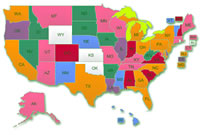A bit of advance planning goes a long way. Before you begin divorce proceedings, take steps to prepare for what lies ahead. When you divide property and income, each of you will have only half of what you had before, or perhaps less. If you don’t have your own regular income, you will need money to live on until you can get an award of alimony or until the divorce is finalized and you have access to your share of the marital assets. As a result, you will need to gather information and time your actions strategically.
By familiarizing yourself with the 12 financial pitfalls of divorce, you can save yourself a lot of hassle and heartbreak in the future. Here’s a quiz to help you get started:
12 Financial Pitfalls of Divorce – The Quiz
| 1. | What’s the most important thing to have in a divorce? |
| a. | A big glass of wine every night. |
| b. | A pile of money in the bank. |
| c. | A good friend to call. |
Answer: B
In divorce, everything always costs more and takes longer than you expect. Expenses begin to mushroom as soon as the divorce process starts. If you feel a split is imminent, start stashing the funds you’ll need for attorney’s fees and living expenses. The more money you can set aside before the divorce proceedings begin, the less anxiety you’ll face when the big day comes.
| 2. | When is it important to start preparing for divorce? |
| a. | Before your husband walks out. |
| b. | As the process server walks up to the door. |
| c. | As soon as possible. |
Answer: C
Divorce is a long, complicated process that requires careful preparation. Don’t just pack your bags, load up the kids, and drive away in a car that needs four new tires. Instead, prepare by using joint funds to undertake any needed car repairs, to pay for necessary dental work for the children, and to buy any career clothes you will need. Think about the timing of the separation: Is your husband due any bonuses or other windfalls in the near future? Don’t separate until after they arrive, so you can get your share. Of course, if you’re the one scheduled to get the bonus, well, there’s no time like the present.
| 3. | What records will you need during the divorce process? |
| a. | Anything you can get your hands on. |
| b. | Records? Who needs records? |
| c. | Whatever is in the pile on the kitchen table. |
Answer: A
The three most important words during divorce are: document, document, document. When you divorce, you must identify the assets you and your husband have accumulated and establish their value. Even if your husband was in charge of the finances while you were married, it’s now up to you to find those records. You are entitled to your share of any marital property you find, and any additional income you discover may increase the amount of earnings that are used to calculate alimony and child support.
| 4. | What should you do to find hidden assets? |
| a. | Spin around in a circle until you’re dizzy and then stop and point at something. |
| b. | Do a careful inventory of everything you jointly own. |
| c. | Run off to the Cayman Islands. |
Answer: B
Don’t overlook any assets-half of everything is yours! Small assets, such as frequent flyer points and vacation pay, can add up. Even if you don’t want an asset, it can be used to trade for something you can use. Don’t overlook hobbies or side businesses that might use expensive equipment or generate income. If you have a PHT degree (Putting Honey Through), you might be entitled to compensation for the expenses you paid to get your spouse through school.
| 5. | Tax consequences are: |
| a. | Something you don’t need to worry about. |
| b. | Very important in determining the structure of your divorce agreement. |
| c. | For the IRS to handle. |
Answer: B
Although divorce is not a taxable event you have to report on your tax return, it can still have tax consequences. Assets that might have hidden tax traps are houses, retirement plans, securities that are worth much more than they cost, stock options, annuities, cash value of life insurance policies, and vacation homes. Your attorney, though well versed in marital law, may not know all the ins and outs of current tax law. Your situation may require the help of an accountant knowledgeable about taxes to determine if you are really getting a good deal.
| 6. | While you are going through a divorce, you should: |
| a. | Be an active participant. |
| b. | Sit back and let the lawyers handle it. |
| c. | Let your ex decide everything. |
Answer: A
During divorce, being uninformed can be very, very expensive. Learning as much as you can and negotiating directly with your husband, if possible, will help you recover more quickly from the divorce. That is because you will have a healthy sense of control over the process, be focused on practical things, and be working with your ex to get things done. Taking an active role in the negotiations will help you reach a better settlement than letting the attorneys handle it. You will have less conflict and litigation after the divorce, better compliance from your ex, and better sharing of information about the children.
| 7. | Mixing money and emotion is: |
| a. | A great idea-just do what you feel like doing every day. |
| b. | Something to indulge in now and then. |
| c. | A dangerous combination. |
Answer: C
During this trying time, it’s easy to confuse your feelings with the facts. Try to be as dispassionate and businesslike as possible. View your attorney as a paid professional rather than a friend or confidante. When your grief is overwhelming, go home or to a friend’s house, not to your attorney, who is billing you at an hourly rate. Make property division decisions based on your own long-term best interests, not out of revenge. It won’t make you happy to declare war on your ex. Make an effort to bring the divorce to a successful conclusion with as little rancor as possible.
| 8. | Fighting for what’s yours is: |
| a. | A risky idea. |
| b. | Part of making sure that you get everything you deserve. |
| c. | Something nice girls don’t do. |
Answer: B
Women tend to be supportive and sensitive to the needs of others, to build bridges, and to “make nice.” These tendencies often get in our way during divorce. Divorce is about survival, not making friends. You have to insist on getting what you need and deserve. Even if you hope that you will eventually be able to reconcile with your ex, don’t bend over backwards to make it happen. Stand up for yourself and get your share. If you reconcile, that’s fine. If you don’t, you’ll still be able to take care of yourself financially.
| 9. | Taking control is: |
| a. | Unnecessary. |
| b. | Unavoidable |
| c. | c. Very, very important. |
Answer: C
Unfortunately, you can’t call your attorney and say, “I want a divorce. Please call me when it’s over.” The only way out is through, and you are in charge of getting there. Going through a divorce can sometimes make you feel like the captain of a leaky boat on stormy seas-there seems to be a new crisis at every turn. Use this time of upheaval to start taking control of your life. Vow never to worry in the dark. If you can’t sleep, turn on the light, pick up a pencil and paper, and write down your worries. Then, you can go back to sleep and deal with them first thing in the morning. Listen to your attorney, but make your own decisions. This is your divorce, so take control of the process!
| 10. | In divorce, you should: |
| a. | Plan for the best, but prepare for the worst. |
| b. | Close your eyes and jump. |
| c. | Just think happy thoughts and everything will be okay. |
Answer: A
During divorce, prepare yourself mentally for the worst that can happen. How will you cope if you have to move in with your parents? If the divorce proceedings last for years and you lose all of your money? If your ex remarries within two weeks, moves to Tahiti, and refuses to pay any support? Face the worst so what actually happens will seem easy by comparison. Don’t panic and let your fears rule your life. Face them, and take control.
| 11. | A career is: |
| a. | Unnecessary if you are receiving alimony. |
| b. | For the peasant class. |
| c. | Extremely important to successfully surviving divorce. |
Answer: C
Many women put their careers aside to concentrate on their families. After divorce, you will probably need to figure out a way to support yourself and your children. Divorce is an excellent time to get some career counseling at the local job center, university, or community college. There’s nothing like new knowledge and a fulfilling career to bolster your self-esteem.
| 12. | Good professional advice is: |
| a. | Very important to make sure that your decisions will work for the long haul. |
| b. | Something to spend a few bucks on, now and then. |
| c. | A bad, bad thing. |
Answer: A
Right now, you need all the help you can get! Divorce can be very complicated, so don’t try to do it all yourself. Get the best advice you can afford. Hire an attorney who can give you excellent guidance, even if you plan to negotiate part of the divorce yourself. Engage a forensic accountant if you think there might be hidden assets. Find a good therapist to help you emotionally. Hire a financial adviser who specializes in divorce to help determine the best settlement options for you and to help you determine how best to invest the assets you receive in the divorce. Don’t skimp now on matters that will affect the rest of your life.







